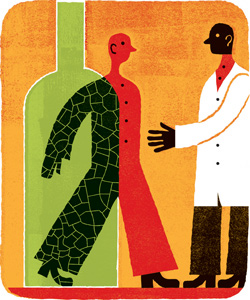Think it takes a month in detox to quit drinking? Think again. The largest-ever study of alcohol treatment programs, whose results were published in the March Journal of the AmericanMedical Association, found that the disease responds best to the same approach used to treat hypertension, high cholesterol, diabetes, or any other illness with a behavioral component: medication and regular visits with a counselor or medical professional. Run by Robert Swift, a professor of psychiatry and human behavior at Brown and codirector of the Center for Alcohol and Addiction Studies, the study tested the effect of two drugs and two therapeutic programs on 1,383 alcoholic subjects at eleven sites nationwide. Swift, who is both a psychiatrist and a pharmacologist, ran the largest site, at Roger Williams Medical Center in Providence, and was the study’s principal investigator.
Run by Robert Swift, a professor of psychiatry and human behavior at Brown and codirector of the Center for Alcohol and Addiction Studies, the study tested the effect of two drugs and two therapeutic programs on 1,383 alcoholic subjects at eleven sites nationwide. Swift, who is both a psychiatrist and a pharmacologist, ran the largest site, at Roger Williams Medical Center in Providence, and was the study’s principal investigator.
The study tested two drugs: naltrexone, which blocks alcohol’s effects on internal opiates in the brain, and acamprosate, which works on the neurotransmitter glutamate. Subjects in the test took either medication, a placebo, or no medication, and underwent differing levels of psychotherapy. Some had weekly fifteen-minute visits with a medical professional. Others participated in more specialized outpatient therapy, which combined the most successful elements of other detox therapies. “We rolled them all together,” Swift says. “It’s the kind of [therapy] you’d get in a really good alcohol treatment program.” The patients taking naltrexone and receiving either brief medical checkups or therapy, or both, fared best. Those receiving no medication did worst.
From a physician’s standpoint, Swift says, the study opens up treatment options unavailable to many patients because of insurance restrictions and expense. He points out that of the ten million Americans classified as alcohol abusers, only two million receive treatment, mostly through Alcoholics Anonymous or residential treatment. Many more patients could be helped with medication and visits to either a medical professional or a therapist, or both.
A Cheaper Way to Quit
By Charlotte Bruce Harvey ’78 / July / August 2006
December 6th, 2006





